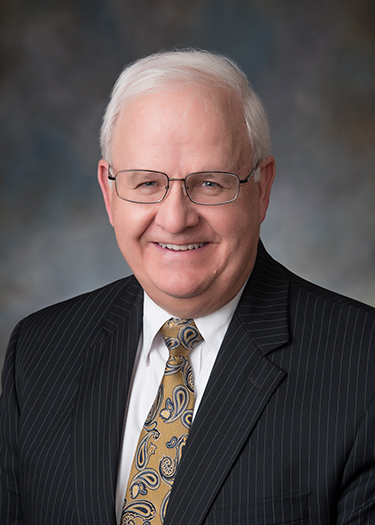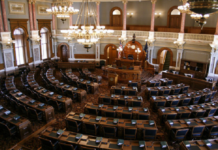Gov. Laura Kelly’s administration is running into questions about how far it can go to collect sales taxes from out-of-state retailers on internet transactions.
Late last week, revenue officials directed out-of-state retailers to collect Kansas sales taxes starting Oct. 1, citing last year’s U.S. Supreme Court decision that allowed for internet sales tax collections.
The Supreme Court found that states could require businesses to collect sales taxes, even if they don’t have a physical presence in the state.
The justices upheld a South Dakota law that set a minimum threshold of business activity before collecting internet sales taxes.
Kansas does not set a minimum sales threshold, raising questions about whether it is complying with the parameters established by the Supreme Court when it upheld a sales tax on internet transactions.
The lack of a small-seller exception as set out in the South Dakota law puts Kansas at risk of a lawsuit, said George Isaacson, the Lewiston, Maine, lawyer who argued the sales tax case on behalf of the retailers before the Supreme Court.

“The state is running the risk that its notice will be challenged in court,” he said of the Revenue Department’s guidance.
“One of the unfair features of it is that the notice is directed against small companies by not having a small-seller exception,” Isaacson said.
“Those companies are the least capable of mounting a legal challenge. It’s really picking on small guys.”
Last year, the U.S. Supreme Court found that the South Dakota law didn’t pose an undue burden on interstate commerce because, among other things, it set a minimum level for internet sales tax collections at $100,000 in sales or 200 transactions.
The court also noted that the South Dakota law wasn’t retroactive and that the state had adopted national standards for reducing administrative and compliance costs of collecting an internet sales tax.

Revenue Secretary Mark Burghart said Kansas is on solid legal footing. He said the department is adhering to state law, which requires out-of-state retailers to collect sales taxes.
“We don’t get to pick and choose what we enforce,” he said. “We have to enforce the laws of the state of Kansas passed by the Legislature and approved by the governor. At this point in time, those out-of-state companies are required to collect and remit.”
While the state may not have a minimum threshold, Burghart said the state meets the court decision in other ways: The law is not retroactive, and Kansas has adopted national standards for collecting sales taxes on the internet.
“We don’t have any reason to believe that you have to have it exactly the way South Dakota had it,” Burghart said in an interview. “The decision did not set forth any criteria that says you have to do this, this and this.
“They said this is what South Dakota did, but they didn’t say every state has to do this,” he said.
Isaacson disagrees. He said the small-seller exception established with the minimum sales threshold was important to the court when it found that internet sales tax collections don’t impede interstate commerce.
“Clearly, the Supreme Court considered the small-seller exception to be an important factor in reducing the burden and not interfering with interstate commerce,” Isaacson said.
“The court was specifically talking about the case in front of it,” he said. “That small-seller exception…was specific in the South Dakota statute.”
Burghart said small businesses can comply without extra cost because Kansas is part of the Streamlined Sales and Use Tax Agreement, which standardizes taxes to reduce administrative and compliance expenses.
He pointed out that small businesses within the state are required to collect the same sales tax that small out-of-state retailers are being required to collect.
“The same small companies do business in Kansas, too,” he said. “Do they have an exemption? No. They are required to collect and remit on sales, even though they don’t have many sales.”
Isaacson said what Kansas is doing will have disproportionate impact on small businesses.
He noted that the Streamlined Sales and Use Tax Agreement mentioned in the Supreme Court case is just one of the factors the court used in reaching its decision.
“Even though (the streamlined sales tax agreement) might reduce the burden,” Isaacson said, “it by no means reduces that burden to a point where a very small seller can bear that expense.”
The Kansas Legislature tried to set a minimum threshold for collecting an internet sales tax at $100,000 in sales.
But it was packaged with other controversial tax provisions aimed at returning a so-called revenue windfall created by changes in the federal tax code. Kelly vetoed both tax bills that would have addressed internet sales.
Isaacson suggested that a $100,000 threshold might not even work for Kansas, which has a larger population than South Dakota.
“One might conclude that if you were looking proportionately, it should be even larger than it was in South Dakota,” he said.
The agency’s directive drew criticism from the conservative-leaning Tax Foundation, which called it the “most aggressive remote sales tax collections regime in the country.”
The group’s director of state tax policy said that “Kansas’s aggressive approach represents a radical departure” from legal consensus following the Supreme Court’s decision in South Dakota v. Wayfair.
“By taking this approach,” wrote Jared Walczak, “Kansas is putting small sellers in a bind, forcing taxpayers to foot the bill for a difficult legal battle, and potentially imperiling the state’s remote sales tax regime altogether, a possible outcome that a more reasonable approach would have avoided.”
Republican state Rep. Steven Johnson, chair of the House tax committee, said businesses across Kansas have been asking the state for parity with online retailers. He said any decision to move ahead should be balanced with any associated legal risks.
“I think our Main Street businesses have been asking for a level playing field for some time, and I think delivering that to them sooner rather than later is a good thing,” he said.
Senate President Susan Wagle, who is running for the U.S. Senate, lashed out at the governor for the Revenue Department’s action.
She said the agency was aggressively trying to collect sales tax from all out-of-state retailers.
Wagle said she would ask Attorney General Derek Schmidt to intervene. A spokesman for Schmidt said he is aware of the situation.
Schmidt, along with attorneys general from 40 other states, filed a brief in support of South Dakota in the Supreme Court case.
While Schmidt praised the Supreme Court decision when it was handed down, he did not address the particular question about the minimum threshold provided for in the South Dakota law.
“The court has rightly sided with the states on this issue, allowing states to choose to collect sales tax on all goods sold, whether the item is purchased through a local retailer or through an out-of-state website,” Schmidt said.













